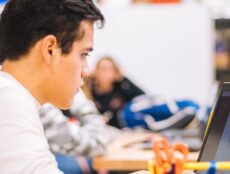
Articles
Editor’s Picks
Why I Built a Virtual Studying Platform in the Midst of the Pandemic
By Calix Huang
August 10, 2021
If you’ve ever been a student, you’ve probably worked in a study group at some point. Whether it was the desire to commiserate with others, find camaraderie in the study process or get motivated, there are many factors that draw us to groups of people working towards similar goals.
It’s also in our human nature to imitate and luckily, study groups use our natural instinct of imitation to our advantage. It’s simple: we want to work because those around us are working. We see it all the time — students going out of their way to meet with friends in the library or work in a cafe when they have a big project due.
COVID-19 Wiped Out the Social Element of Studying
But, what happens when that’s not physically accessible? The COVID pandemic raised that very question. Libraries were locked down, cafes weren’t safe to meet in, and it seemed like all we could do was just stay home. Same responsibilities, but with less freedom and significantly less access to social support.
But in today’s hyper digitally-connected world, there had to be another way to simulate the concept of a study group but in a virtual space. So that’s what I did: I built a virtual studying platform.
In October 2020, Hours began as just a fun project, based on the popular productivity technique called Hours where people study one-on-one with an accountability partner for hour intervals. I shared the first version, which was pretty scrappy, with my mom as well as a few close friends. After seeing the impact it was having on this select group, the hobby quickly turned into a more serious venture.
Throughout the next 3 months I took advantage of product feedback and user interviews that I conducted on a weekly basis. I focused on growth shortly after because I wanted to impact as many students as possible. I knew that organic and word-of-mouth marketing would be highly effective, and also cost-effective. I also attended a YC Entrepreneur school and did a lot of YouTube binging to help get the marketing juices flowing.
Frankly, I knew that my main users would be high school and college students and that Discord servers were public and easy to find, so I joined 80-100 different study servers and started hosting and inviting others to join sessions on Hours. If a student enjoyed the platform, I thought they might invite their friends and become informal ambassadors of the product, which is exactly what happened.
Hours Picks Up Steam — and Gets Picked Up
After six months of product iterations and proactive outreach on Discord, Hours had served more than 20k students across 130+ countries and was soon after acquired by Fiveable, a social learning company.
Virtual study spaces open up opportunities to work with people one may never get to meet in real life. Despite libraries and schools opening up, studying remotely will remain the most accessible option for students around the world. As we come to understand just how much technology can empower us to carry out everyday responsibilities, people will be less inclined to go into a physical institution or location. After all, convenience and community are two of the major elements that today’s students seek out to elevate their learning experience.
Students will always struggle to find motivation and enhance productivity. We as education advocates should always be asking questions like: ‘what can we be doing to address this’ or ‘how might we be able to leverage technology to make the transition to virtual support as seamless as possible?’
Virtual study spaces will undoubtedly be embedded in the way future generations study together, so let’s continue to iterate. If a platform like this can be built in just six months, what else can we develop to make the future of learning more community-driven, productive and accessible?
 Calix Huang is a 16-year-old self-taught coder, engineer, and developer with a passion for startups and consumer tech. He founded Hours and currently works as a product manager at Fiveable.
Calix Huang is a 16-year-old self-taught coder, engineer, and developer with a passion for startups and consumer tech. He founded Hours and currently works as a product manager at Fiveable.
Featured Image: Ralston Smith, Unsplash.









[…] på får kids uppleva nåt annat”, säger Megan Rierdon, specialpedagog på skola i Milwaukee. Megan har på sin skola börjat att använda sig av VR för upplevelser. Barnen får en rundtur i växthuset. “När skolors budgets tightas åt så gäller det […]
[…] At the 53rd St. School in Milwaukee, special needs educator Megan Rierdon could not take her students on field trips with the rest of the school. However, using VR headsets, she was able to give her students the same experiences their peers were having, according to eLearning Inside. […]
[…] they had acquired Texas-based software company SuccessEd in a bid to expand their reach further innovate special educational services for the K-12 community. Details of the deal were not […]